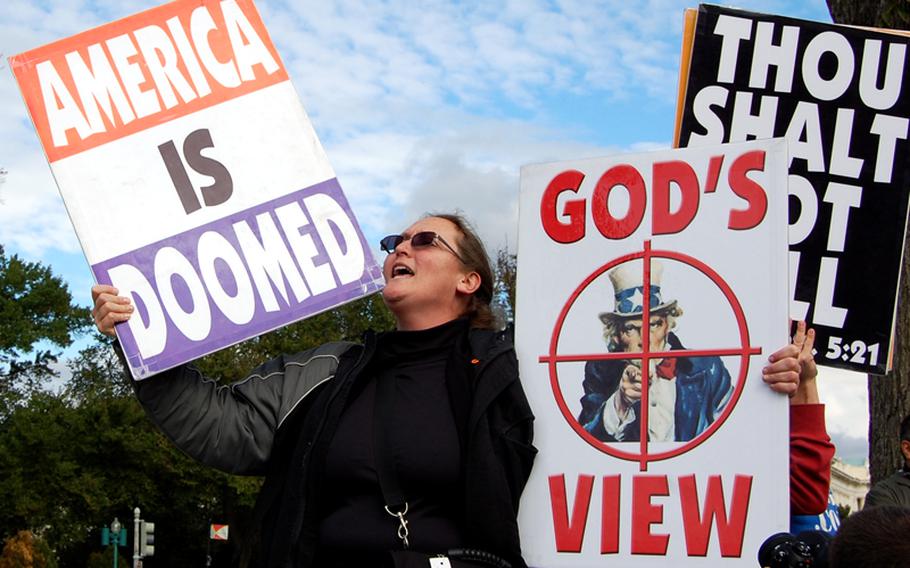
Abigail Phelps, a member of the Westboro Baptist Church, protests outside the U.S. Supreme Court in October. (Felicia White/Stars and Stripes)
WASHINGTON — It is now up to the Supreme Court to decide whether picketing servicemembers’ funerals is harassment or a form of public discourse protected by the First Amendment.
The court heard oral arguments Wednesday on the case of the father of a fallen Marine, who sued the radical Westboro Baptist Church for picketing near his son’s funeral because it believes God is punishing the United States for its tolerance of gays.
Al Snyder sued the church after it picketed the funeral for his son, Marine Lance Cpl. Matthew Snyder, in 2006 with signs that read “God hates you” and “Semper Fi fags.” Snyder won on trial but lost on appeal and was ordered to pay the church $16,000 in court fees.
On Wednesday, the atmosphere was professional but contentious as the justices peppered both sides with questions rather than let them give long speeches.
Justice Ruth Bader Ginsburg, for example, asked why the First Amendment would allow the church to exploit the Snyder family’s grief.
In response to other questions, church attorney Margie J. Phelps argued that Snyder became a public figure when he talked to local media about his son and asked why troops are dying in Iraq.
The church went to the funeral as part of that public discussion, argued Phelps, daughter of church founder Rev. Fred Phelps Sr.
Justice Elena Kagan pressed Phelps on whether that argument would work if the court determined that Snyder is a private figure, not a public one.
Phelps didn’t have an answer for Kagan, but she reiterated that the church has the right to make its case to anyone who enters the public domain. However, she conceded that laws against stalking and other limitations factor into when and where the church can protest.
Snyder’s attorney, Sean E. Summers, also faced tough questions from justices looking into the broader issue of what speech crosses the line.
Ginsburg seemed to suggest that the matter could have been handled by existing laws when she asked why Snyder didn’t file an injunction to prevent the church members from showing up. She also raised the possibility that the “God hates you” sign held by protesters could have referred to society in general instead of Snyder’s son in particular.
Summers said that Snyder would not have objected if the protesters had held generic anti-war signs instead of making a personal attack.
Responding to the justices’ questions, Summers acknowledged the church did not violate any state laws during the protest and that Snyder could not see what the church members’ signs said until the wake when he saw television news coverage of the event.
Kagan raised the Supreme Court’s ruling in favor of Hustler Magazine, which ran a parody advertisement claiming Rev. Jerry Falwell had incestuous relations with his mother. In that case, the court decided that there is no objective standard to determine which speech is “outrageous.”
Summers said he hoped the First Amendment was not created to allow people to harass mourners at a private funeral.
The court is expected to rule on the case by the end of June 2011.
Speaking to reporters after Wednesday’s hearing, Summers called Phelps’ argument that Snyder was a public figure “patently absurd.”
By the church’s rationale, anyone who loses a loved one in Iraq or Afghanistan and talks to local media for an obituary can be targeted by the church, he said.
Phelps also held a news conference afterward and predicted that all of the justices would rule in her favor.
After reiterating the church’s position that troops’ deaths are God’s wrath, she and other members of the church started singing, “You’re going straight to hell on your crazy train,” to the tune of a Black Sabbath song.
The court is expected to rule on the case by the end of June 2011.